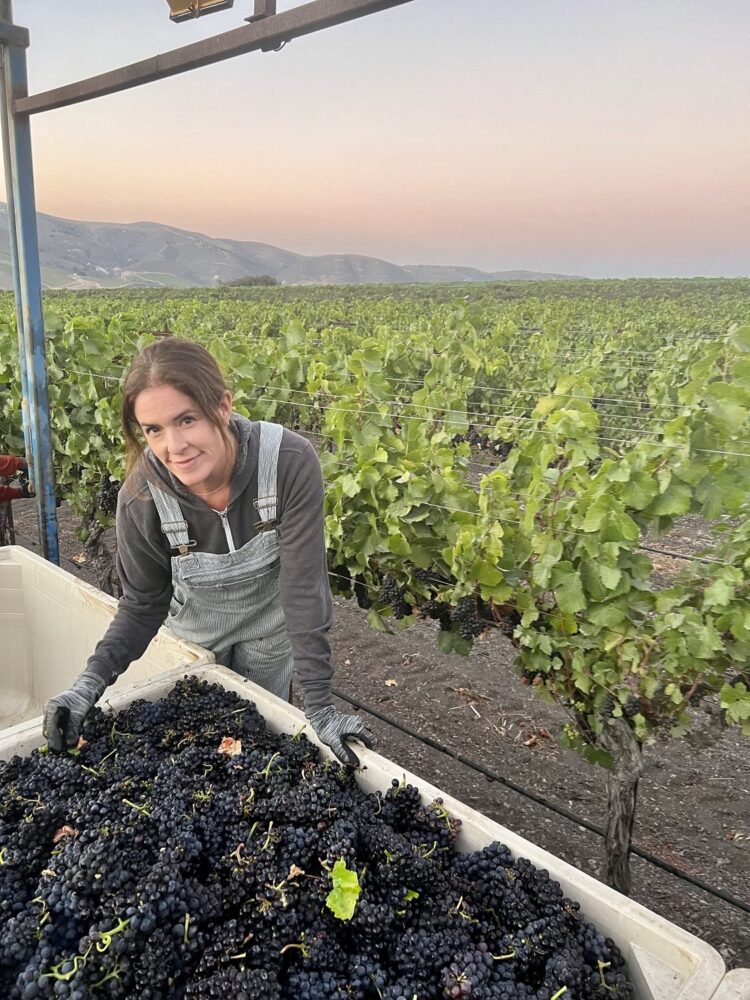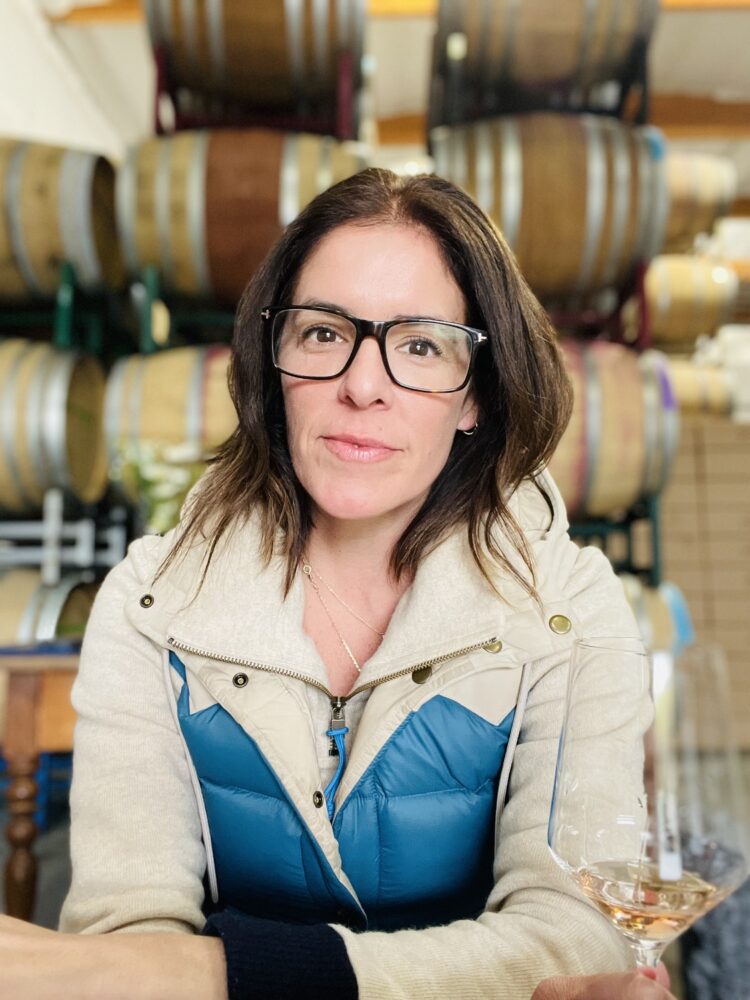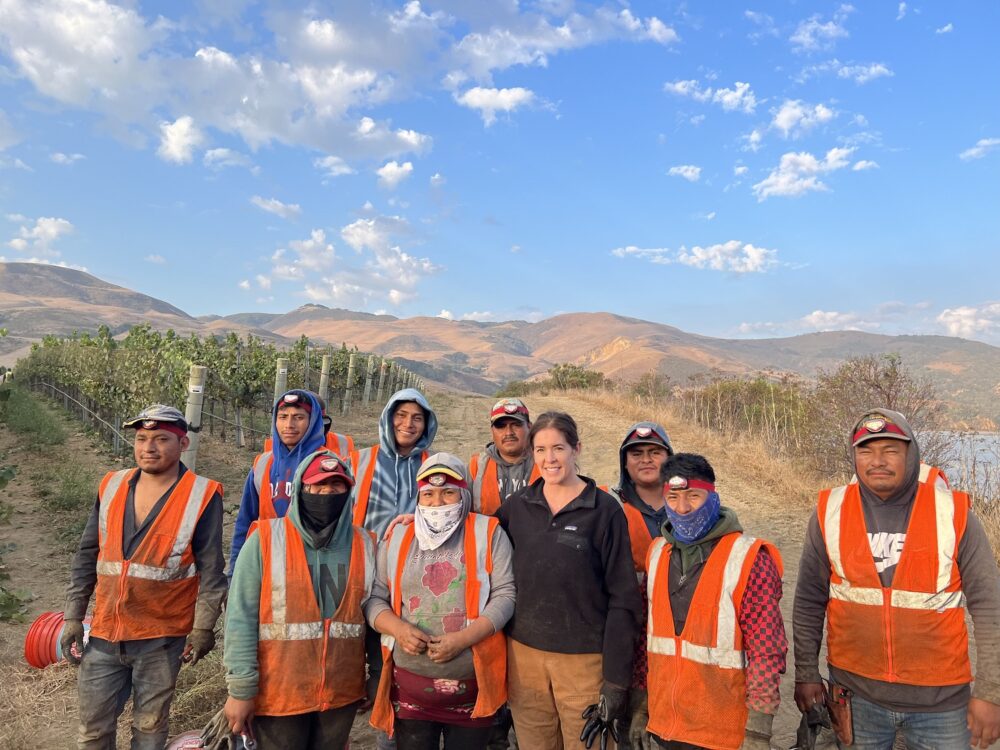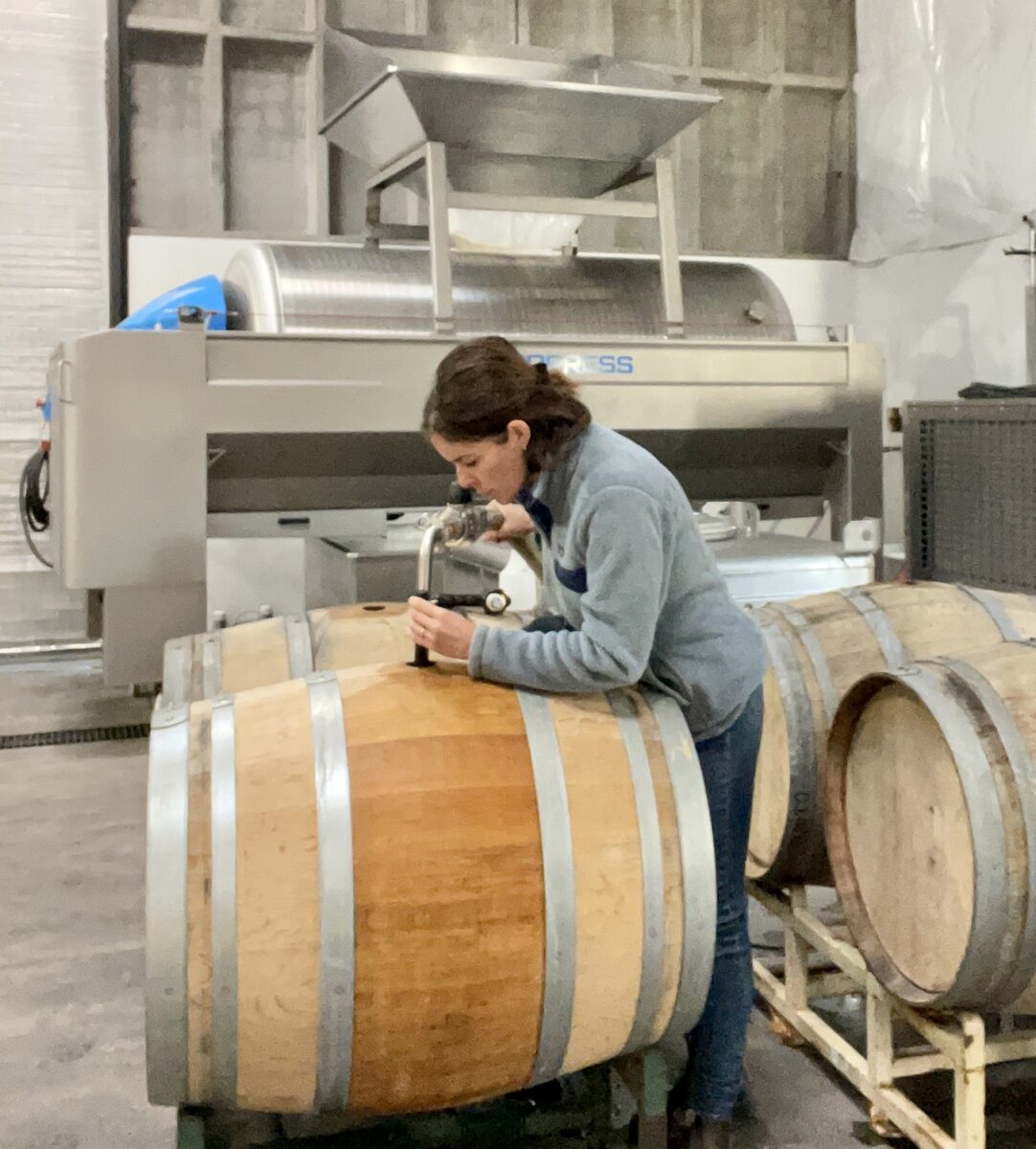
Back in 2012, while taking meetings at Sanguis, a small urban winery in downtown Santa Barbara, I’d see a young woman, slight, quiet, with long dark hair, working diligently in the background. Sometimes she’d be tending barrels. Other times she’d be washing equipment. Just over a decade later, that young woman, Jessica Gasca, is winemaker and owner of her own winery in Santa Barbara County, Story of Soil.
We caught up recently to chat about her life as a winery owner, winemaker, mother, wife, and community advocate. Still youthful at 43, she’s dressed casually in a gray hoodie and jeans, a simple necklace dangling an “E” for her five-year old son Emerson.

“I didn’t go to UC Davis or Cal Poly or anything like that.” Gasca got into wine by exploring what she considers the fundamentals. “Typicity and terroir. What should Pinot Noir taste like from Santa Barbara? Burgundy? Oregon? If you’re tasting blends, that’s really difficult to do.”
Instead, she focused on single vineyard, single origin wines. She was enamored by a wine from Larner Vineyard, a vineyard-designate in Santa Barbara’s Ballard Canyon AVA made by winemaker McPrice (Mac) Meyers. It sparked her imagination and sent her down a pathway where she became obsessed with tasting single-vineyard wines. “That’s how I really learned about Santa Barbara.”
We’re drinking her own 2021 Larner Vineyard Syrah, one of 15 single-origin, single-site wines she produces annually under her brand, Story of Soil. I ask her why she didn’t name her brand “Gasca.” “I don’t believe wine is about me. It’s about where it’s grown. My job is to tell that story, about that piece of land.”
Good-humored and energetic, she occasionally adjusts her black-framed glasses when she speaks. “I’m not just a winemaker. I’m also a business owner. Those are two very different sets of expectations and goals – and stressors. That’s a part of my everyday, year-round responsibility. I’m a mother, wife, and the president of the Santa Barbara Vintners Foundation, so I’m very involved in the community. On a day-to-day basis, every day, my purpose is ‘What can I accomplish today?’”
She’s come to prioritize her days in ways that are realistic for her. “My house is not clean. My bed is not made. A lot of things slip by, but the important things, the priorities, get done: getting up, making sure my son is happy, hugged, and loved.”
On every bottle of her wine, these words appear: Wine made in gratitude. “Gratitude is part of my daily practice. I’m trying to get through it all positively and in gratitude.” She doesn’t believe in a traditional God that “sits upstairs, saying yes and no to prayers, but I believe in a higher power than myself. Every day I wake in gratitude for everything from taking a breath to having my husband and my son at my side. And I get to be in nature a lot.”
As an inveterate multi-tasker, she has learned to loosen her grip on the pursuit of perfection, especially when it comes to winemaking. She tells me she fails constantly. “I’ve been doing this since 2012. I look back at my journey and think, holy shit, I had no idea what I was doing in 2012. In 10 years, I will look back and say I had no idea what I was doing in 2023! Part of my exploration of wine is understanding that I may be chasing something that’s not possible to obtain, and that’s a hard thing, if you’re aiming to do something good or great. I want to do better every year, but it’s so hard to learn when Mother Nature is your teacher. You can’t have a talk with that teacher.” Instead, she seeks counsel from fellow winemakers. “As much as I want to make a perfect wine, I’ve come to the realization that may not happen in my lifetime and that’s okay.”
While we drink her 2021 Grenache from the Slide Hill vineyard designate in Edna Valley – an elegant, balanced wine; fruit-forward and fresh, while maintaining some restraint and a healthy natural acidity – our talk turns to the natural wine movement. Throughout our chat, she’s cognizant of wanting to work with organic and biodynamic vineyards and pursues sustainability at every turn, but tells me, “I’m not a natural winemaker. I use sulfur. I also fine and filter my white wines and roses, mostly because I don’t want to drink a chunky white wine. I don’t want to chew my wine.”
She racks her red wines, in pursuit of “a great texture and mouth fill. I’ve come to realize it’s important to intervene in certain ways. I don’t think that means you have to use chemicals or other substances to correct a mistake or problem in a wine. 2022 was a hard vintage. I got my ass kicked. There was severe reduction in some wines.” A lot of winemakers from whom she sought counsel advised her to use copper. “I don’t want to put copper in my wines. I just don’t. I don’t add color pro, gum arabic, milk fining. I do bentonite-fine the whites and I use sulfur, but that’s about it. I’m not dogmatic, but I try to stay minimal interventionist.”
She’s keen to learn about regenerative agriculture and works closely with the vineyard managers and farmers who oversee the 15 vineyard designates with which she works. They discuss farming protocols and philosophies, and she’s careful not to work with any conventionally farmed fruit. “I believe we’re ruining the planet. The last couple of vintages with these heat spikes have been upsetting and hard. That’s global warming and climate change. We can’t pretend it doesn’t exist.”
Gasca was born and raised in Southern California. As a child and teenager, she loved the creative arts: acting, piano, dancing. “I was an outgoing kid who wanted to sing, dance and do community theatre.”
At the age of 15, she got a job stocking a salad bar at Souplantation. She put herself through college working in restaurants. In her early twenties, while working in a sports bar off the Sunset Strip, she couldn’t shake her interest in the theatre. “I loved being on stage.”
She moved to New York to pursue acting and is classically trained in Shakespeare and the dramatic arts. In 2003, at the age of 23, she was bitten by the wine bug when she got a job bartending on the Upper West Side at French restaurant Nice Matin. She was transfixed by the sommelier on duty. “He was talking about history, geology, geography, science, art, all through a glass of wine.” While she credits her time at Nice Matin as having provided her with a unique opportunity to learn about wines, especially French wines, she moved back to California shortly thereafter. “I wasn’t tough enough for New York.”
She doesn’t have any regrets giving up acting, but she does regret not having pursued playing soccer. “When I was in the fifth grade, I really loved soccer. I remember these boys saying, ‘Soccer is for boys, so you must be a boy.’” She made a conscious decision at that age to never play soccer again. “I was good at it. I loved it. If I could do one thing differently, it would have been to keep playing soccer.”
Does she hope her son Emerson will grow up to be a winemaker? “He’s really into math. My husband taught him to play chess, and he loves to play with my husband. If I had to guess, he will probably be an engineer or architect. If I had to make a bet right now, I’d say he’s not going into the wine industry.”
As much as Gasca thrives in the business, she finds aspects of it deeply troubling, especially overconsumption by some members of the wine industry. “I like talking about topics people don’t necessarily like to talk about. Drinking is supposed to be okay because we’re winemakers. I have a number of people in my family who struggle with alcohol, so I want to keep myself in check. Overconsumption is glorified. Wine for breakfast, lunch, and dinner. But we have to be careful, because not all of us have an off switch. Working in this industry, it’s easy to get carried away, and that’s a difficult thing.”

She’s equally outspoken about her Mexican heritage and advocates for farmworker health care through her work as president of the Santa Barbara County Vintners Foundation. Last year, the Vintners Foundation raised nearly half a million dollars, with proceeds going in part to Community Health Centers of the Central Coast (CHC), providing medical services to Santa Barbara’s farmworker community. She also produces a Pinot Noir under Story of Soil called “Gracias a Ti Por Tus Manos,” donating 100% of the proceeds back to the Vintners Foundation, benefiting Direct Relief International and the CHC.
“I am proud my grandparents immigrated here. I’m proud of the people who work our lands. I want to give them credit, lift them up. Get them what they deserve. A sustainable community is not just about vineyards.”

